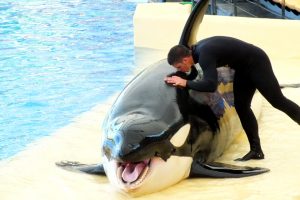Exclusively for zoos.media – 17.03.2021. Author: Philipp J. Kroiß
This news has shocked many: the orca Skyla suddenly and unexpectedly died in Loro Parque, Tenerife. This article explains the background.
Loro Parque: Orca Skyla’s sudden death
On the night of the 11th to the 12th of March 2021, the orca Skyla died in Loro Parque, Tenerife. She passed away very suddenly due to an illness that cannot be prevented: volvulus. Many dog owners will know this, especially those who have older dogs. From one moment to the next, a loop of intestine twists around itself, causing the animal’s death if there is no surgical intervention.
Volvulus – a serious illness

Volvulus is known to occur also in humans. To establish a diagnosis, an imaging method is necessary (mostly x-ray and ultrasound) and the patient must be provided with surgical care because if left untreated it will generally lead to death. The average fatality rate in humans is 20% – which shows just how dangerous it is. The illness affects mostly infants, but it can also affect adults, and then every second counts.
It isn’t on most people’s radar because it is quite rare and unless there is a case in one’s immediate surroundings or a pet suffers from it (a dog, cat, or guinea pig, for instance), you never come into contact with it. Moreover, nobody knows why it occurs, which is why there are no preventive measures against it.
The risk factors on the other hand are known – one is age and the other is rib cage size. This has been researched quite well for dogs: Great Danes and Bloodhounds have a 30% chance of developing such a twist in the course of their lives, Sighthounds and Collies a 20% chance, and the Irish Wolfhound has an 18% chance. If you now look at an orca skeleton, you see that it has a huge rib cage.
There is no cause & no treatment

Given this, one can imagine that orcas also run the risk of their stomach or intestines getting into disarray. Skyla is certainly not an exception. In 2015, the male orca Valentin died of the same cause in Marineland Antibes at the age of 19, so similar in age to the 17-year-old Skyla. In 2002, the young orca Algonquin died at the age of two in Marineland Canada from the same cause.
This illness occurs in cetaceans in nature as well as under human care, and it is of course subject of science and research. 18 cases were recorded in a central study – nine were stranded animals and the other nine were animals under human care. The latter deaths all occurred out of the blue and there was nothing that could have predicted them.
The problem is that even if this could be diagnosed quickly, which is not possible at present, there is currently no treatment available for orcas. It is not possible to just lay an orca on an operating table, cut it open, fix the issue, and then sew it back together. Killer whales cannot be put under general anaesthesia to perform such a complex emergency surgery.
Experts are currently completely powerless against this illness in orcas: it is usually only detected during the autopsy, and there is nothing that can be done to prevent it. In the case of humans or other animals, the situation is slightly better, but that is thanks to research that just isn’t available for orcas. Skyla’s death, as terrible and tragic as it is, will drive this research forward.
It has nothing to do with the husbandry
As mentioned above, volvulus can occur in nature as well as under human care, and there is no known cause for it. All allegations associating Skyla’s death with her husbandry are wrong, ignorant, and completely unfounded. In nature, she would not have had any chance of surviving this illness – she would also have died.
That is the sad truth, and while it cannot provide comfort, it does show how unfounded the populism of animal rights activists and other zoo opponents is. Throughout her life, Skyla has done far more for orca conservation than those who now want to use her death to discredit orca husbandry.
Orca Ocean in Loro Parque is a centre for research, education, and nature as well as population conservation. Killer whales might not be globally threatened, but several populations are on the brink of extinction. Loro Parque Foundation provides active help here, working together with the animals at Orca Ocean on various levels. Skyla’s legacy is her contribution to the conservation of her wild conspecifics and their habitats, and it is worth its weight in gold.
